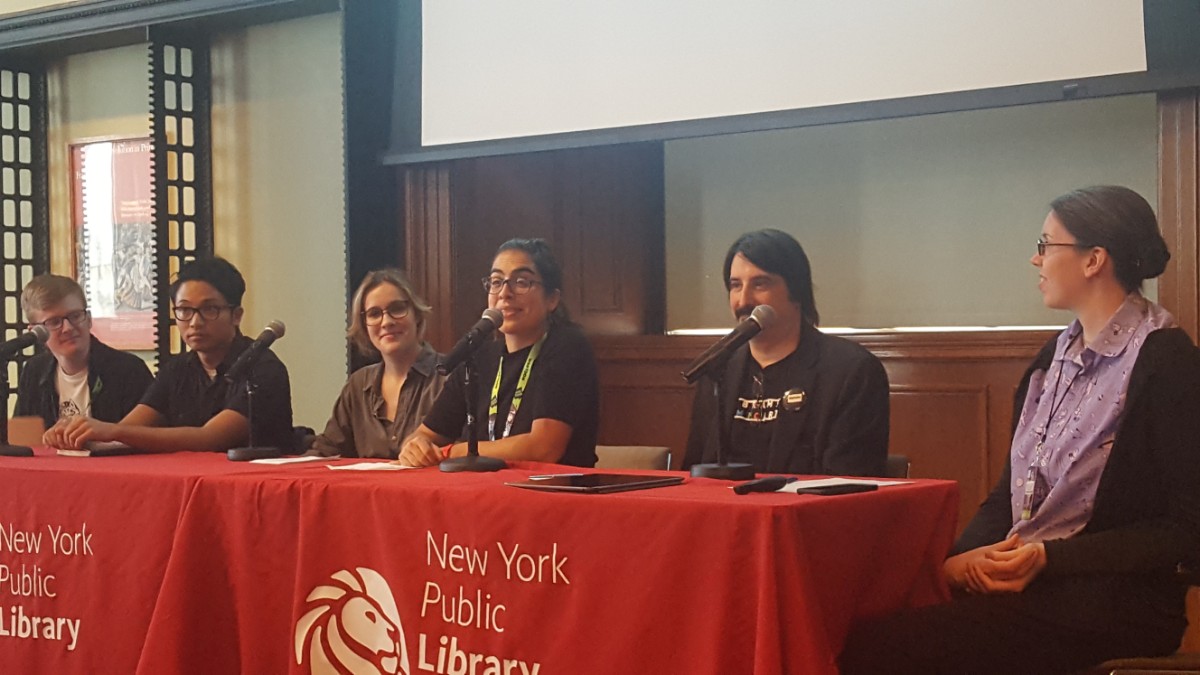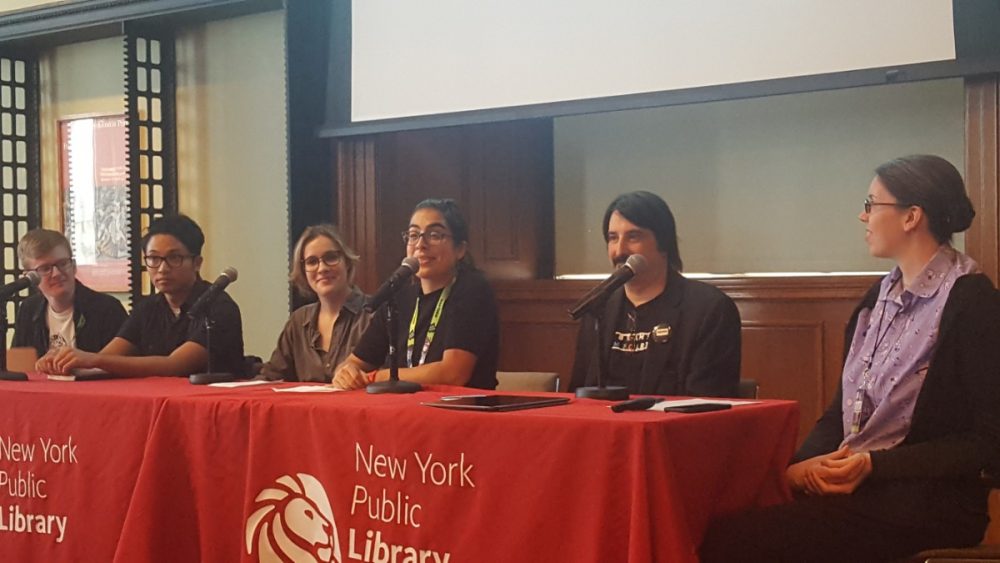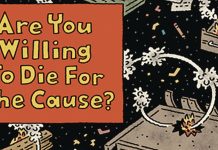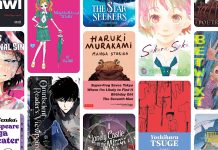by Sara L. Jewell
On Thursday morning, for the second consecutive year, NYCC kicked off by hosting a full track of off-site programming for educators, librarians and comics professionals at the New York Public library. With topics ranging from building a classroom curriculum around Marjorie Liu’s Monstress to “#RepresentationMatters In Your School Library”, the day’s programming placed a vital emphasis on incorporating diverse and challenging comic book narratives into educational and scholarly spaces.
First among these panels, “Literary Comics to Build Your Collection”, featured a slew of professionals from the publishing industry. Gina Gagliano, Publishing Director at Random House, moderated the conversation between Julia Pohl-Miranda (Drawn + Quarterly), Margot Wood (Oni Press), Geoff Lapid (Nobrow), Leigh Walton (Top Shelf) and Charles Kochman (Abrams ComicArts) as they talked about what makes a comic book “literary”, and recommended some exciting titles from their own houses that fit the bill, ranging from historical non-fiction to novel adaptations to children’s and YA adventure books.
The conversation started out with the panelists thinking about what it means for a comic to be “literary”. Kochman kicked off the discussion by bringing up the easiest example: adaptations of merit-worthy novels, citing Damian Duffy and John Jenning’s recent Eisner-winning adaptation of Octavia Butler’s sci-fi masterpiece Kindred. Pohl-Miranda concurred with him that literary books are often found outside of the Big Two – she placed an emphasis on books by single creators – “beyond superhero books, where no one owns the properties”.
Wood said that for her, she thinks of books as being literary when they have emotional and social complexity that challenges the reader. Lapid admitted to struggling with the idea of defining the term literary within comics, especially the connotation of pretentiousness, but talked about the importance for him of seeing experimentation with style and form. Walton talked about feeling like literary comics transcend the commercial roots of comics publishing. He seemed to agree with Pohl-Miranda’s view that this is often the province of single creators, saying that ideally you are “seeing the person behind the page – you come away feeling like you’ve really made a connection to another human being.”
The conversation then shifted to thinking about the parameters of literary comics in the context of age, genre, and visual media. Kochman pointed to subjectivity, saying that “a good illustrator will not just communicate what’s happening, but how it feels”. Wood avowed that the parameters are different between prose and comics, and that she will often read a script separately from looking at the art when first approaching a comic. Lapid mentioned that for him, the parameters feel ambiguous, and that he feels that there are fewer “rules” with literary comics than with superhero comics. Walton noted that with comics, “the total impact [of a work] is greater than the sum of its parts”, so rigid definitions are difficult.
Thinking about the current comics market, most of the panelists agreed that indie support is hugely important, as well as librarians discussing comics with patrons, especially young people and their parents. Pohl-Miranda talked about the great strides comics have made in recent years to even be perceived as literary and gain acknowledgement, bringing up Nick Drnaso’s book Sabrina having recently been nominated for the Man Booker Prize. Lapid corroborated this, but cautioned that while “reluctance [to accept] comics has gone down in the past few years” that there’s still a way to go – that for many, comics are still perceived as a bridge to “real books” and not “real books” in their own right.
The panelists finished up by listing their personal literary comic recommendations from their respective houses:
Charles Kochman/Abrams ComicArts
- Becoming Andy Warhol (Nick Bertozzi, Pierce Hargan)
- The Best We Could Do (Thi Bui)
- The Bridge (Peter J. Tomasi, Sara Duvall) – Historical story of the Brooklyn Bridge
- Bizarre Romance (Audrey Niffenegger, Eddie Campbell) – notably a collaboration between a “literary” prose writer and cartoonist
- Run (Andrew Aydin, John Lewis, Nate Powell, Afua Richardson) – for March readers
- A Fire Story (Brian Fies) – follow up to Mom’s Cancer ”Probably the greatest graphic novel that I have worked on”
- A Suicide Bomber Sits in the Library (Jack Gantos, Dave McKean)
- Kindred – (Damian Duffy, John Jennings) – Abrams just announced that Jennings will curate their new line, Megascope, focused on “rediscovering powerful speculative work by and about people of color and also visualizing new diverse narratives through the comics medium.”
- Nobody’s Fool (Bill Griffith)
- Showtime at the Apollo: The Epic Tale of Harlem’s Legendary Theater (Ted Fox, James Otis Smith)
Julia Pohl-Miranda/Drawn + Quarterly
- Berlin (Jason Lutes) a 23-year endeavor, historical fiction
- Boundless (Jillian Tamaki)
- Love That Bunch (Aline Kominsky-Crumb) “frank, confessional”
- Poppies of Iraq (Brigitte Findakly and Lewis Trondheim)
- Pyongyang: : A Journey in North Korea (Guy Delisle)
- Rolling Blackouts (Sarah Glidden) “very nuanced and complex”
- Sabrina (Nick Drnaso) “chilling”
- Syllabus (Lynda Barry)
- Moomin books (Tove Jansson ) “really great example of literary comics for kids”
Margot Wood/Oni Press
- Capote in Kansas (Ande Parks, Chris Samnee)
- One Soul (Ray Fawkes) “hugely ambitious and experimental”
- Petrograd (Philip Gelatt, Tyler Crook)
- Pilu of the Woods (Mai K. Nguyen) “very sad and will make you cry”,
- The Tea Dragon Society (Katie O’Neill) “queer friendly Eisner winner”
- Archival Quality (Ivy Noelle Weir, Steenz)
- Oyster War (Summer Brennan) “super odd, big, oversized, beautiful”,
- The Altered History of Willow Sparks (Tara O’Connor)
Geoff Lapid/Nobrow
- Kingdom (Jon McNaught),
- Hilda and the Stone Forest (Luke Pearson)
- Audobon, On The Wings of the World (Fabien Grolleau)
- Curveball (Jeremy Sorese) genderqueer protagonist with a Sci-fi
- Dead Endia (Hamish Steele) YA graphic novel story of a trans runaway who goes to work at a theme park where the haunted house is actually haunted!
- Geis (Alexis Deacon)
- How To Survive in the North (Luke Healy)
- Map of Days (Robert Hunter)
Leigh Walton/Top Shelf
- A Shining Beacon (James Albon)
- Come Again (Nate Powell)
- Girl Town (Carolyn Nowak)
- Gumballs (Erin Nations)
- Home Time (Campbell Whyte) “a little bit like an Australian version of Narnia”,
- Penny Nichols (MK Reed, Greg Means, Matt Wiegle) “a romantic comedy about falling in love with a hobby”
- The Story of My Tits (Jennifer Hayden)
- They Called Us Enemy (George Takei)
- The Three Rooms in Valerie’s Head (David Gaffney)









A page to bookmark, for more reading.
Comments are closed.